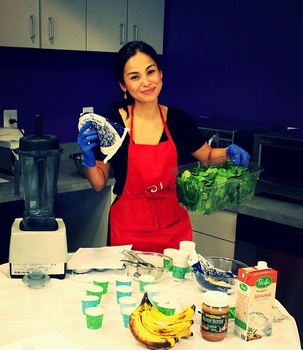 Mai with her three children. Mai with her three children. We are all in the middle of trying to keep our New Year’s resolutions, and many of those include healthier eating. Mai Trinh, nutritionist, and busy mom of 3, explains how to navigate the latest super foods, fasting fads, and the biggest mistakes people make when they are trying to change over to a healthier lifestyle. It's the New Year and there are a lot of resolutions flying around - especially when it comes to nutrition. What are the biggest mistakes women who are ready to take the plunge into better diets and fitness routines make? The biggest mistakes I see over and over are subscribing to extreme fad diets and not getting enough sleep, which wreaks havoc on your metabolism. Going from one extreme to the other is seldom sustainable. Instead of doing a 7 day no food and only liquid detox cleanse which I would never recommend – why not start slowly like cutting all soda and sweet drinks out for a week and then build on that small, but profound step. Studies show time and time again that a majority of Americans drink a bulk of their calorie intake through sweet drinks. Curbing the daily Starbucks run and limiting the daily wine intake to 1 drink per day maximum is a great start for a one week lifestyle shift to build upon other lifestyle shifts. As for fitness, working in a group and getting support builds confidence. I belong to a mommy boot camp that has been meeting for years. I have only been a member for the last year and a half. Also, I invested in a personal trainer for 30 minutes a week. If that isn’t in your budget or lifestyle- stick to classes you think you will enjoy like Zumba or getting a friend to speed walk with you during lunch. It doesn’t have to be all or nothing. The first step could simply be using a pedometer and aiming for 10,000 steps a day. However, exercise without cleaning up your diet defeats your health goals. There seems to be a new super food every week and it is hard to figure out which is best for whom. What are your go-to super foods for women and do they vary by age? I try to stay away from fad diets and tell my clients that if your great-grandmother didn’t recognize it as food, don’t eat it, it’s probably not food. As far as everyday superfoods – one gauge is how long has it been around the food chain. My favorite whole food super foods include spinach, mushrooms, blueberries, garlic, onion, turmeric, cinnamon, wild caught salmon, sweet potatoes and my exotic superfood includes goji berries. Everything on my list is anti-inflammatory and helps boost your immune system. These are cancer fighting goodies that keep your system in check and wild caught salmon is chockfull of Omega-3 acids which is great brain food. Our brain is comprised of 60% fat and is the fattiest tissue in our entire body. We need good fats to think clearly so the no fat diet has been debunked. As far as varying by age, that's a great question! Every 7 years, every single cell in our skeleton is replaced. It's important to know that foods that worked for you a decade ago, may not work for you now. Adults develop food allergies to things that they were able to digest years before. So, the question of do foods vary by age - it does. Kids that are four years and below often have a difficult time digesting raw leafy veggies until their digestive tract matures. Every gut is unique like every finger print is unique. There is not a one size fits all answer. In my nutrition studies, I found the idea of bio-individuality to be key in leading my clients to the right lifestyle that fits their health. People need to experiment with different super foods to see what alleviates their energy. There are universal truths though- that smoking, abusing alcohol, eating a diet full of high sodium, saturated fat and processed sugar and lack of exercise will significantly raise your chances of cancer, stroke, diabetes and heart disease You have three kids and a busy life. How do you get your family to eat healthy snacks and dinners on the run? I’m a single mom, widow, small business owner and I continue to take graduate level courses in public health so my plate is quite full. What I’ve learned from juggling so many acts is to plan ahead not only with my schedule, but with nourishing food. I am constantly scanning the web for easy, fast and nutritious vegetable heavy dishes. I’m a big fan of both one pot meals and the crock pot. Family snacks include clementines, nuts and trek mix. I also make easy energy apple balls that consist of pitted dates, dehydrated apples and oats. Some days, I slather organic peanut butter on an apple. When I’m really in a crunch, I boil organic eggs, use frozen organic veggie mix, add a dash of Braggs Amino Acid with a pat of organic butter and mix it with quinoa or whole wheat cous cous. This is my idea of fast food. In short, I keep my snacks and dinners to simple whole foods that can be prepped quickly. Instead of going to the fast food joint, I will often have a rotisserie chicken in the fridge, I’ll put it in the crock pot on warm and by dinner time, I will sautee veggies and voila, dinner is served. I keep my meals simple and whole. A few women (and men) I know would love to cook healthier food at home, but feel like it isn't well received. How important is it getting your partner and/or kids on board when you want to move to a healthier lifestyle? It is vital to have everyone on board if you want to make lasting change for your health overall. The first question I ask when talking to clients is: Will your spouse be supportive of this change? Numerous studies show that the people closest to you heavily influence your health. If your spouse is resistant to change- I suggest getting your significant other hyped for homemade fruit smoothies in the weekend. Small steps are profound. What I found with families is kids emulate their parents. If they see their mom taking better care of herself, they start to take her lead. Another big thing to incorporate healthier eating habits is to include kids in cooking the healthier meal. Also, giving dishes blockbuster names like Suzy’s Incredible Hulk Power Smoothie. It’s simple, but studies have shown, it works for kids and school cafeterias. What does a typical session with a Health Counselor or Nutritional Consultant entail? I’m a certified health counselor and I teach nutrition and preventative health seminars to Fortune 500 companies and government agencies. I’m also on the Speakers Bureau at Kaiser Permanente Health Works program so my reach is not limited to what Registered Dieticians have to subscribe to – which are USDA standards. In my work, I teach groups and individuals health promoting foods and preventative care. My first step is to spend 50 minutes on a health history to gather information about my client to gage what their goals are and what their family history looks like. During this time, I also ask what obstacles have been in their way of reaching their health goals. I find that a majority of the time, people know exactly what they need to do for their health, but don’t have the support or they self-sabotage their goals due to emotional blocks. I teach people to modify their health goals in small and sustainable steps. Did you grow up in a healthy eating environment? And how much does how we eat when we are kids affect what we eat as adults? I grew up in a mixed environment. My step-dad was on the macrobiotic diet [based on whole grains, vegetables and beans] in the early 1990s and I would help prepare his meals. My mom did not practice a healthy diet and subsequently, suffered from health issues in her 40s. I grew up seeing both sides of the dietary spectrum. What we eat as kids can lead us into bad habits especially when it comes to leaning toward comfort foods. However, the human spirit is remarkable when it is motivated and supported for change. In my 20s, I had a terrible diet of soda, McDonald’s and vending machine food. I was always getting sick and suffering from rashes. At 29, I drastically changed my lifestyle and I can honestly say, I feel more energetic now than I did in my 20s and I’m 40 years old! How often do you see clients who use food as an emotional crutch and what are the signs of that? In my seminars and my private practice, the way we eat is linked to how we feel, what we crave, our stress levels and how much we sleep. Sleep deprivation leads us to eat salt, sugar and high caloric foods. Everything is tied into what we decide or mindlessly put in our mouth. I see food used as filling an empty void all the time. Signs of emotional eating are eating mindlessly, eating out of boredom, intense cravings for foods that you know aren’t healthy for you. Reframing daily habits takes around 3 to 6 months for permanent change. One question I often ask clients is what does food mean to you? Draw a picture. It’s a very powerful tool to gauge if you see food as nourishing or is it wrought with guilt and punishment? And now, for the down and dirty: Do you ever sneak in a trip to McDonald's? I guess what I'm asking is do you ever break the rules and is that ok? Two things you will never see me eat are McDonald’s and soda. I haven’t eaten McDonald’s or used a microwave for over 8 years. However, in my daily life – I keep a 80/20 rule. 80 percent of the time, I keep a clean diet and 20% of the time, when I’m out – I allow myself to indulge. I love pizza so at home, we make our own, but if I’m out—I will indulge at a kid birthday party. It is okay to break the rules, but keep it minimal. If you are under an austere lifestyle – you can rarely maintain that kind of oppressive lifestyle and it makes living a bit joyless. I do help clients wean away from soda permanently because there is a seldom an upside to drinking processed chemicals. Instead, I help them learn to substitute – half sparkling water with a splash of 100% juice. Juice is still sugar, but if you dilute it with sparkling water, it is still less caloric than soda. By Suzette McLoone Lohmeyer
0 Comments
|
Archives
June 2017
Categories
All
|

 RSS Feed
RSS Feed